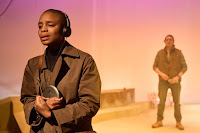How to Fight Loneliness
by Neil LaBute
director Lisa Swirling
with Justina Kehinde, Archie Backhouse, Morgan Watkins
set and costumes Mona Camille • lighting Chuma Emembolu
Park Theatre, London • 16.Apr-24.May.25 ★★
Neil LaBute takes on another thorny topic with this 2017 play, which is making its UK premiere at the Park Theatre. Because the issue is so intense, there is a level of engagement here that feels undeniable, even as the play itself seems to drift within its own monologues, never quite cracking the surface. It perhaps doesn't help that it takes more than half an hour for the subject matter to emerge, deep into a scene that is essentially an extended red herring. This somewhat undermines the characters themselves, leaving them oddly unlikeable even as we want to identify with them.
In a living room that is designed to look like a desert, with a dirt floor, stone furnishings, dried-out foliage and a sun-like lamp suspended in front of a sky-like backlit wall, a loved-up young white-collar couple is laying out snacks and drinks for a guest. Brad (Archie Backhouse) invited this stranger over against his better judgement, while Jodie (Justina Kehinde) feels like she needs him. Eventually, the working-class Tate (Morgan Watkins) arrives, and it turns out that he went to school with Jodie. It also emerges that, due to rumours about his past, Brad and Jodie think he would be perfect to help Jodie end her suffering as she comes to the end of the road regarding treatment for a fatal brain tumour.
A fundamental flaw in the premise never stops niggling: Jodie says she has tried suicide multiple times but simply can't do it, but she is also unwilling to relocate to a state like Oregon, where euthanasia is legal. By contrast, Brad wants her to fight for her life, even though it's clear that she has been doing so for many years, including a period of remission. His yearning is about what he is losing, both Jodie and the children he hoped to have with her. Both of them state and restate these feelings over the course of the play's two-plus hours. Opposite them, Tate's quirky and eerily dispassionate responses feel like the voice of reason and compassion. But they contain their own flaws, because he is compromised by his own feelings.
This situation develops through circuitous conversations, as each of person opens up about their internal feelings while never quite moving forward. Kehinde is the soul of the play, adding resonant emotions at every point, largely because this is Jodie's story and hers are the only feelings that matter. Her physicality also conveys a wonderful sense of dignity and resolve that drives the narrative forward. Watkins' brings intrigue to the enigmatic Tate, overcoming the caricature of the stereotype with engaging internalised nuances. Comparatively, Brad is written as much more one-note, which doesn't give Backhouse much to work with, so he has to strain to earn the audience's sympathy.
While the sets and costumes add interest and texture, as does a lively injection of humour into the dialog, much of this is essentially random (such as Tate's amusing insistence that he's not a vegetarian even though he doesn't eat meat). And there's a certain nervous energy that flows throughout each scene, as these people try to explore bigger ideas in their twisting, spinning conversations. So there are fascinating questions along the way about perspective and empathy, expectations and extrapolations. But there are also no real insights, aside from a point that there is ultimately no trick to getting through this messy thing called life.
photos by Mark Douet • 22.Apr.25







No comments:
Post a Comment